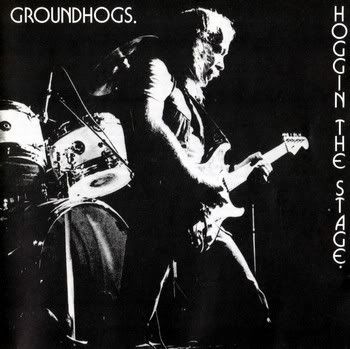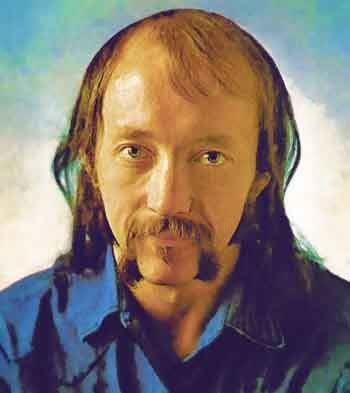
The Groundhogs - Hoggin' the Stage - 1995 - Receiver
A brilliant live recording from the Groundhogs. This album was originally released as a double LP, on the Psycho label in 1984, with live recordings from Leeds, and London in 1971, and Stockholm in 1976. This album had the extra tracks, "Live Right," and "Love You Miss Ogyny." It also included an EP, with the tracks, " Cherry Red/Split Part 2," and "Light My Light." The album was also released in 2006, on the Talking Elephant label as "Hoggin' the Stage Plus" with 15 tracks, including live bonus material. The Groundhogs began in 1964, when Tony McPhee and Pete Cruikshank formed John Lee's Groundhogs to back John Lee Hooker on a British tour. They released the great blues album, Blues Obituary, in 1969. After that, they became more heavy prog rock orientated, and, starting with 1970's Thank Christ For The Bomb, they had three Top Ten albums during the early Seventies. The Groundhogs never achieved the status of many far less talented bands, but they are a very important part of psychedelic / blues / progressive rock. Check out Tony McPhee's 1973 "Two Sides of Tony McPhee " album, and buy The Groundhog's great 1972 album, "Who Will Save the World? The Mighty Groundhogs." There is info on the Groundhogs rare "Extremely Live" 1988 album @ GHOGS/EXLIVE and Tony McPhee's "Foolish Pride" album @ TMCPHEE/FP Read about this great underrated band @ GHOGS/BIO/WIKI
TRACKS / COMPOSERS / LOCATIONS / DATES
1 Cherry Red McPhee - Recorded Live in Leeds, 13/3/1971
2 Garden McPhee- Recorded Live in Leeds, 13/3/1971
3 Split, Pt. 1 McPhee- Recorded Live in Leeds, 13/3/1971
4 Groundhog Blues Davenport- Recorded Live in Leeds, 13/3/1971
5 Eccentric Man McPhee - Recorded Live in Stockholm, 1976
6 Split, Pt. 2 McPhee- Recorded Live in Stockholm, 1976
7 Mistreated Townsend - Recorded Live In London, 1971
8 Still a Fool Waters -- Recorded Live In London, 1971
9 Boogie With Us McPhee - Recorded Live in Stockholm, 1976
10 Your Love Keeps Me Alive McPhee - Recorded Live in Stockholm, 1976
BAND
Rick Adams - Guitar (Stockholm)
Mick Cook - Drums (Stockholm)
Pete Cruickshank - Bass (Leeds/London)
Ken Pustelnik - Drums (Leeds/London)
Martin Kent - Bass (Stockholm)
Tony McPhee - Guitar/Vocals

BIO
The Groundhogs were not British blues at their most creative; nor were they British blues at their most generic. They were emblematic of some of the genre's most visible strengths and weaknesses. They were prone to jam too long on basic riffs, they couldn't hold a candle to American blues singers in terms of vocal presence, and their songwriting wasn't so hot. On the other hand, they did sometimes stretch the form in unexpected ways, usually at the hands of their creative force, guitarist/songwriter/vocalist T.S. (Tony) McPhee. For a while they were also extremely popular in Britain, landing three albums in that country's Top Ten in the early '70s. The Groundhogs' roots actually stretch back to the mid-'60s, when McPhee helped form the group, named after a John Lee Hooker song (the band was also known briefly as John Lee's Groundhogs). In fact, the Groundhogs would back Hooker himself on some of the blues singer's mid-'60s British shows, and also back him on record on an obscure LP. They also recorded a few very obscure singles with a much more prominent R&B/soul influence than their later work. In 1966, the Groundhogs evolved into Herbal Mixture, which (as if you couldn't guess from the name) had more of a psychedelic flavor than a blues one. Their sole single, "Machines," would actually appear on psychedelic rarity compilations decades later. The Groundhogs/Herbal Mixture singles, along with some unreleased material, has been compiled on a reissue CD on Distortions. After Herbal Mixture folded, McPhee had a stint with the John Dummer Blues Band before reforming the Groundhogs in the late '60s at the instigation of United Artists A&R man Andrew Lauder. Initially a quartet (bassist Pete Cruickshank also remained from the original Groundhogs lineup), they'd stripped down to a trio by the time of their commercial breakthrough, Thank Christ for the Bomb, which made the U.K. Top Ten in 1970. The Groundhogs' power-trio setup, as well as McPhee's vaguely Jack Bruce-like vocals, bore a passing resemblance to the sound pioneered by Cream. They were blunter and less inventive than Cream, but often strained against the limitations of conventional 12-bar blues with twisting riffs and unexpected grinding chord changes. McPhee's lyrics, particularly on Thank Christ for the Bomb, were murky, sullen anti-establishment statements that were often difficult to decipher, both in meaning and actual content. They played it straighter on the less sophisticated follow-up, Split, which succumbed to some of the period's blues-hard-rock indulgences, putting riffs and flash over substance. McPhee was always at the very least an impressive guitarist, and a very versatile one, accomplished in electric, acoustic, and slide styles. Who Will Save the World? The Mighty Groundhogs! (1972), their last Top Ten entry, saw McPhee straying further from blues territory into somewhat progressive realms, even adding some mellotron and harmonium (though the results were not wholly unsuccessful). The Groundhogs never became well-known in the U.S., where somewhat similar groups like Ten Years After were much bigger. Although McPhee and the band have meant little in commercial or critical terms in their native country since the early '70s, they've remained active as a touring and recording unit since then, playing to a small following in the U.K. and Europe. Richie Unterberger, allmusic.com





1 comment:
Hi,bullfrog. LINKS @
http://www.esoft.
in/music/504786-
groundhogs-hoggin
-the-stage-
1995.html
Fileserve link is best
Thanks to original uploader
Post a Comment